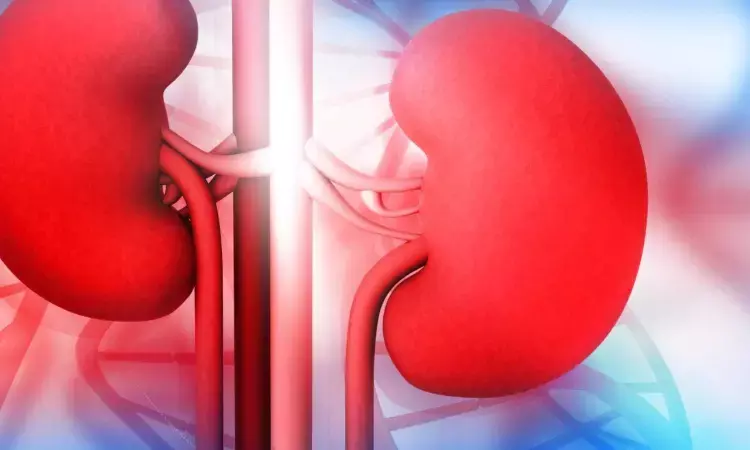- Home
- Medical news & Guidelines
- Anesthesiology
- Cardiology and CTVS
- Critical Care
- Dentistry
- Dermatology
- Diabetes and Endocrinology
- ENT
- Gastroenterology
- Medicine
- Nephrology
- Neurology
- Obstretics-Gynaecology
- Oncology
- Ophthalmology
- Orthopaedics
- Pediatrics-Neonatology
- Psychiatry
- Pulmonology
- Radiology
- Surgery
- Urology
- Laboratory Medicine
- Diet
- Nursing
- Paramedical
- Physiotherapy
- Health news
- Fact Check
- Bone Health Fact Check
- Brain Health Fact Check
- Cancer Related Fact Check
- Child Care Fact Check
- Dental and oral health fact check
- Diabetes and metabolic health fact check
- Diet and Nutrition Fact Check
- Eye and ENT Care Fact Check
- Fitness fact check
- Gut health fact check
- Heart health fact check
- Kidney health fact check
- Medical education fact check
- Men's health fact check
- Respiratory fact check
- Skin and hair care fact check
- Vaccine and Immunization fact check
- Women's health fact check
- AYUSH
- State News
- Andaman and Nicobar Islands
- Andhra Pradesh
- Arunachal Pradesh
- Assam
- Bihar
- Chandigarh
- Chattisgarh
- Dadra and Nagar Haveli
- Daman and Diu
- Delhi
- Goa
- Gujarat
- Haryana
- Himachal Pradesh
- Jammu & Kashmir
- Jharkhand
- Karnataka
- Kerala
- Ladakh
- Lakshadweep
- Madhya Pradesh
- Maharashtra
- Manipur
- Meghalaya
- Mizoram
- Nagaland
- Odisha
- Puducherry
- Punjab
- Rajasthan
- Sikkim
- Tamil Nadu
- Telangana
- Tripura
- Uttar Pradesh
- Uttrakhand
- West Bengal
- Medical Education
- Industry
SGLT2 inhibitors lower chronic kidney disease risk in diabetes patients with higher DCSI: Study

Taiwan: The use of sodium-glucose cotransporter-2 inhibitors (SGLT2Is) significantly lowers the risk of chronic kidney disease (CKD) in type 2 diabetes patients with a higher DCSI (diabetes complications severity index), reveals a recent study published in the Journal of Nephrology.
Wei-Syun Hu from China Medical University in Taichung, Taiwan, and colleagues aimed to investigate the risk of CKD in type 2 diabetes patients with different scores of adapted DCSI who received SGLT2 inhibitors in a retrospective analysis. The DCSI quantifies the severity and presence of complications based on seven body systems or dimensions. It converts laboratory results and diagnostic codes into a 14-level metric quantifying the long-term diabetes effects on seven body systems.
The analysis included 113,449 patients with type 2 diabetes mellitus (T2DM) from the Taiwan NHIRD (National Health Insurance Research Database). They analyzed data collected from 107,440 patients demonstrating a change in DCSI score of < 1 per year, 2289 patients with a score change of > 2 per year, and 3720 patients with a change in score of 1 to 2 per year.
CKD risk throughout the follow-up period was assessed using Cox proportional hazard models. They were adjusted for age, sex, comorbidities, and medications of angiotensin-converting enzyme inhibitors or angiotensin receptor blockers, glucosidase inhibitors, dipeptidyl peptidase-4 inhibitors, biguanides, meglitinides, glucagon-like peptide-1 receptor agonists, insulin, a thiazolidinedione, and sulphonylurea.
The authors reported the following findings:
- The incidence of chronic kidney disease rose from 18.30 per 1000 person-years in patients with a score change of < 1 per year to 137.55 per 1000 person-years in patients with a score change of > 2 per year.
- Higher score change (> 2 per year) patients who received SGLT2 inhibitors had a lower risk of CKD development than patients who did not receive SGLT2Is.
"The use of sodium-glucose cotransporter-2 inhibitors is significantly linked with the decrease in the incidence of chronic kidney disease in T2DM with a higher diabetes complications severity index," the authors conclude.
About SGLT2 inhibitors
SGLT2 inhibitors are a class of prescription medication approved by the US FDA for use with exercise and diet to lower blood sugar in adults with type 2 diabetes. Medicines in the SGLT2 inhibitor class include dapagliflozin, canagliflozin, and empagliflozin. Their safety and efficacy have not been established in type 1 diabetes patients and are not approved by the FDA for use in these patients.
Reference:
Chen, TS., Yu, TS., Lin, CL. et al. Role of sodium-glucose cotransporter-2 inhibitors in risk of chronic kidney disease among patients with type 2 diabetes mellitus. J Nephrol (2022). https://doi.org/10.1007/s40620-022-01522-7
Dr Kamal Kant Kohli-MBBS, DTCD- a chest specialist with more than 30 years of practice and a flair for writing clinical articles, Dr Kamal Kant Kohli joined Medical Dialogues as a Chief Editor of Medical News. Besides writing articles, as an editor, he proofreads and verifies all the medical content published on Medical Dialogues including those coming from journals, studies,medical conferences,guidelines etc. Email: drkohli@medicaldialogues.in. Contact no. 011-43720751


